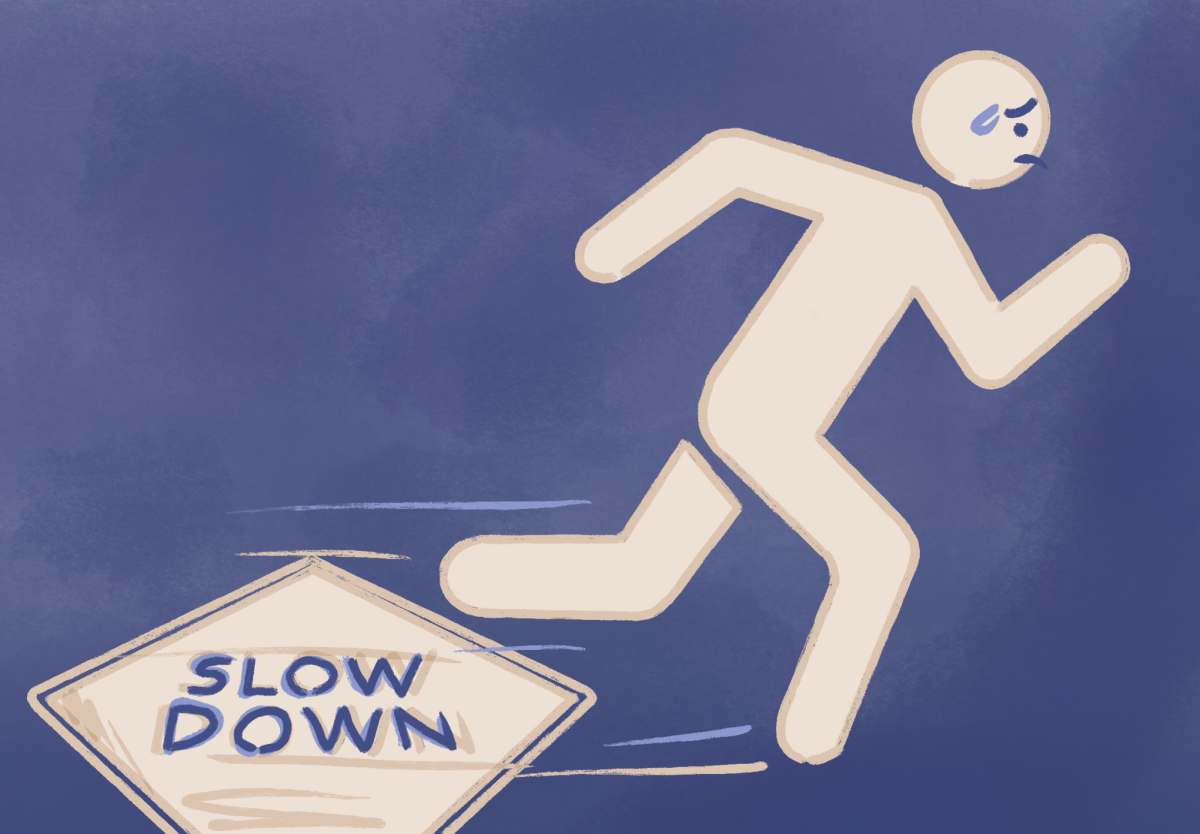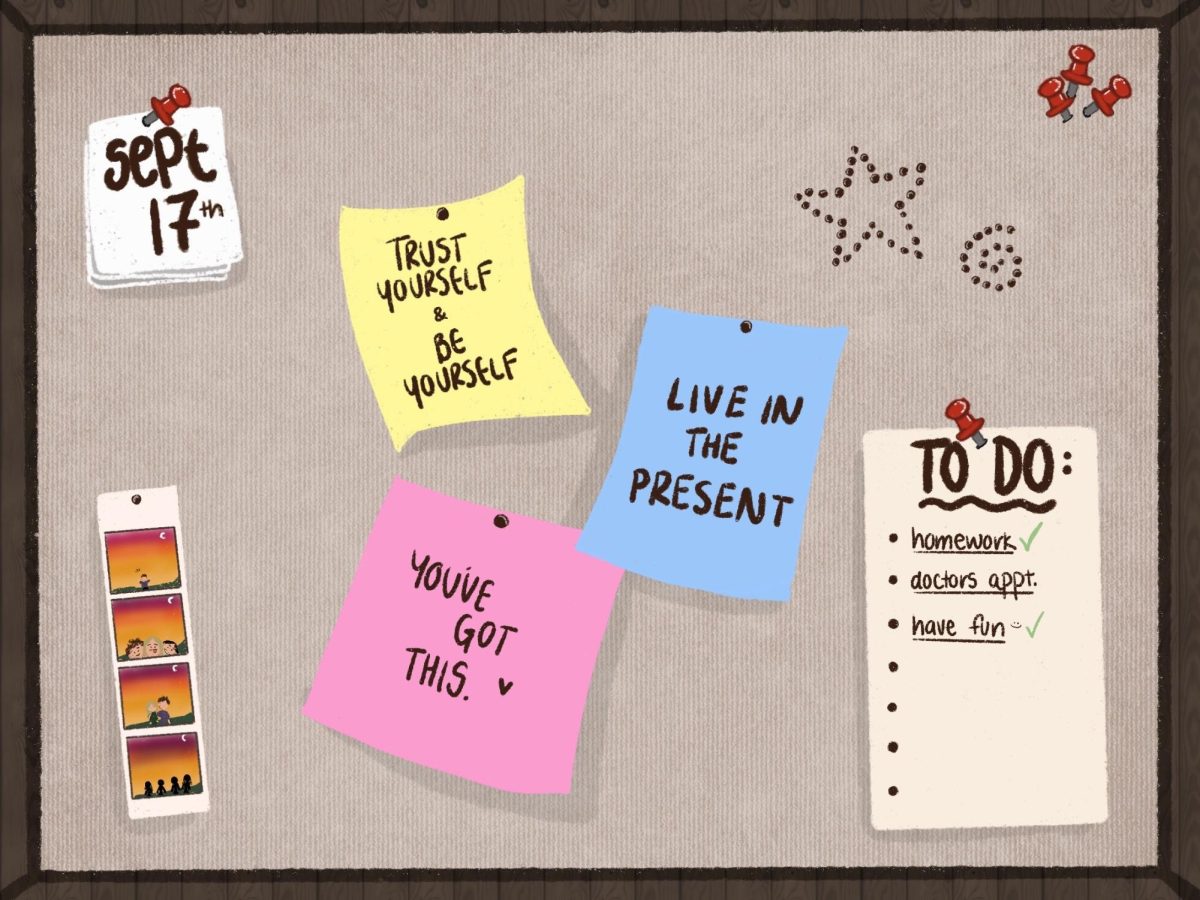The American academic system is designed like a machine that forces students to act like cogs without questioning what happens to the students who get worn down by the constant use and strain.
I feel that pressure every day, fueling my desire to become something more than the circumstances that preceded me. I don’t know when this desire to create something of myself — a sort of legacy — started or how, but it’s become an intricate piece of my identity, one that I wish I could surgically separate from for my own good. It’s a piece that I see echoed in so many of my classmates and friends, both within La Salle and outside it.
At La Salle, academics, grades, and GPA have become such an integrated part of students’ identity — a measuring of their self-worth in quantifying numbers — that it is hard to remove from the student perspective. You can’t see where you actually stand, away from that idea — especially when the standards are encouraged by school, family, and media alike.
It’s common to see certain trends emerge in society such as Hustle Culture — romanticized overworking and sleep deprivation that students believe signifies dedication. In addition to this, there has been an emergence of posts, playlists, and other “inspirations” known as toxic academic motivation — or more interchangeably: toxic academic validation.
A simple Pinterest search of “study motivation” will almost immediately demonstrate the spread of this corrosive rhetoric, with page after page of “motivational” study boards.
Comments on such posts are worse because this type of mindset is normalized and encouraged — even if involuntarily or without us realizing — by peers, teachers, and often family members. Many mention how they know this is toxic, but that it helps them, and they’re really thankful they found it because toxic motivation is the only way for them to pick up a book.
In spite of this, I firmly believe that it’s important to discern the fact that over time, this mindset can create a toxic rut you can get stuck in, though you might not realize it immediately and it may feel helpful at the moment.
An example of this toxic mindset includes negative self-talk. If you’re only filling your mind with negative ideas and concepts, it can harm your mental health in the long run. It’s like a crutch that you always fall back upon, often subconsciously or instinctually.
This mindset has wormed its way into me, haunting my every breath of work, whether it’s art, writing, or — most predominantly — my academics. I’m always thinking about what will look good on my college resumé, and what tassels. grad cords, and pins I’ll receive.
What worries me most is how easily this mindset disguises itself as ambition. For a while, toxic academic motivation feels like fuel — an almost addictive push forward, where you feel better about yourself because you proved the cruel words wrong. You see results: higher grades, late-night study sessions that pay off in test scores, accolades that make the sacrifice feel “worth it.”
But much like any unhealthy coping mechanism, the return on the mental investment doesn’t last forever. Eventually you have to pay it back. What may begin as a boost eventually corrodes your mental health and your relationship with learning itself as you become increasingly more tired and burnt out.
Studies on education psychology have shown that externally motivated students — those driven by external validation, such as grades, competition, or family — report higher levels of anxiety, stress, lower intrinsic interest, and a greater likelihood of burnout compared to students motivated by curiosity or personal fulfillment.
In other words, when “proving yourself” becomes the primary reason to open a textbook or even attend school, the joy of discovery gets overshadowed by fear of inadequacy.
As a result, you’re sucked into a cycle of constantly viewing yourself negatively and becoming susceptible to narratives that claim to promote “academic motivation” but are really tearing you down.
You don’t need to beat yourself six feet into the dirt just to grow a little taller. That’s not how the prettiest or strongest flowers grow.
We know this, yet we are constantly trapped in this cycle, either because we don’t know how to leave, or we don’t want to because we’re seeing results. Humans want to see results for their effort. We want instant gratification; students especially, when it comes to test scores and grades.
I’ve seen this erosion in my friends, family members, and peers.
I’ve seen it in myself, first hand.
At first, it all felt intoxicating, even clever. That idea of “toxic motivation” felt empowering because it was the exact thing I was already telling myself: I could weaponize my negativity for productivity.
But last year, I realized I was moving through everything in a daze. I was no longer learning or creating because I loved it — I was doing it because I had to. Because I was afraid of what would happen if I stopped moving, even if it was just to take a breath.
Every day, I go home, I do school work, I eat, and I sleep, like clockwork. Ask me what I do when I go home or over the weekend, and nine out of ten times, it’s schoolwork.
Every assignment seems like another battle in a war of legacy-building that I’ve convinced myself I need to fight, so I won’t just be another forgotten face. Every grade is a verdict on whether or not I’m succeeding at “making something of myself” or whether I’m actually good.
I haven’t taken the time to actually ask myself who I am outside of grades — outside of school itself — because school is most of our lives. Over the summer, we constantly worry about school starting, and during school, we’re constantly worrying about the next test, or final, or homework assignment.
The cost of this mindset — of toxic academics itself — is subtle but immense. Sleep is treated as expendable when compared to grades, and health as a temporary casualty that should be set aside until we graduate college. Some of my peers insist this sacrifice is justified — that you can always repair your health later, after the acceptance letter or the diploma.
While I respect their stance, I can’t agree like I used to. The idea that health can wait until graduation implies that our bodies and minds are expendable tools, rather than the very foundation of the lives we’re supposedly working so hard to build. If we’re constantly pushing them aside, then we get into that habit. Later is always later, until it’s never.
Burnout isn’t a myth; it’s a deferred debt that eventually comes due, often at the worst possible time, and it isn’t something you can just trudge through. It’s something that sticks around until you finally face it.
Trying to overcome this mindset is difficult, but not impossible. One of the first steps for challenging this mindset is to determine whether or not this craving for academic success and validation is intrinsic or extrinsic.
Does a hurtful comment from your teacher about your grades, or a mention of your parents telling you to work harder make you feel bad about your result? Challenge those negative thoughts with rationality, and acknowledge your efforts even if they aren’t reflected immediately. Rather than viewing their abilities as fixed, students should learn to value and praise their own effort.
Overall, practice positive self-talk.
If history and media have taught us anything, it’s that cycles of self-destruction can become cultural norms when left unchecked. Hustle culture is glamorized as a hallmark of success, brushed off as “just motivation.”
And now, toxic academic validation is wearing that same mask — just studying, just hard work, just ambition. The pattern repeats, offering a fleeting sense of control at the expense of long-term wellbeing. When we learn these ideas, we then pass it down onto younger siblings and children.
We continue the cycle that once hurt us.
The challenge — for me, for my peers, and maybe even education as a whole — is learning to separate genuine ambition from its toxic impersonator. To ask, “Am I chasing this achievement because I love what it represents, or because I’m afraid of who I am without it?”










Chris Babinec • Sep 18, 2025 at 4:32 pm
Piercing, poignant, and a thorough examination that includes biological, psychological, and cultural factors that contribute to these issues. A beautifully written and important piece.